
PM Davutoğlu (L) is seen at a joint press conference with Iranian Vice-President Eshagh Jahangiri. AA photo
Turkey and Iran, two countries on opposite sides of Syria’s civil war, must develop a “common perspective” in order to end sectarian strife in the region, Turkish Prime Minister Ahmet Davutoğlu said during a visit to Tehran on March 5.
Iran, along with Russia, has stood by Syrian President Bashar al-Assad in the five-year war, providing him with military and financial support, while Turkey is his most outspoken critic.
“We may have different views, but we cannot change our history or our geography,” Davutoğlu was quoted as saying by Reuters, standing alongside Iranian Vice-President Eshagh Jahangiri.
“It is extremely important for Turkey and Iran to develop some common perspectives in order to end our region’s fight among brothers, to stop the ethnic and sectarian conflicts,” he said, adding that they should not abandon the fate of the region to actors that are not from the region.
Davutoğlu reminded his hosts that Turkey had stood together with Iran during their hard days under sanctions.
Turkey is close to Saudi Arabia, which has cut its diplomatic ties with Iran and is concerned about Tehran’s growing clout in Lebanon, Syria and Yemen.
“We have our differences on some regional issues, but we are determined to manage the differences to reach stability in the region ... Iran and Turkey would both benefit from regional security and stability,” Jahangiri said in remarks broadcast live.
The comments, days before the planned resumption of Syrian peace talks in Geneva, also reflected a will on both sides to reap trade benefits from the easing of international sanctions against Iran in January.
The removal of the sanctions means the two neighbors can easily exceed their previous trade target of $30 billion annually, Davutoğlu said.
“The main obstacle that prevented us from reaching our goal was the sanctions. Being free of those, means we can easily surpass our goal of $30 billion,” Davutoğlu said, adding he hoped to encourage mutual direct investment.
Trade between the two nations was $9.7 billion in 2015, according to the Turkish Statistical Institute (TÜİK).
Turkey has trailed other European countries eager to tap into Iran’s $400 billion economy after world powers, led by the United States, reached an agreement with Tehran last year that seeks to prevent Iran from developing nuclear weapons.
Turkey mainly sells machinery, vehicles and iron and steel products to Iran. Oil and natural gas make up 90 percent of Iranian exports to Turkey, the Turkish Foreign Ministry said.
Turkey will serve as a key transit for Iranian energy supplies to Europe, Davutoğlu added.